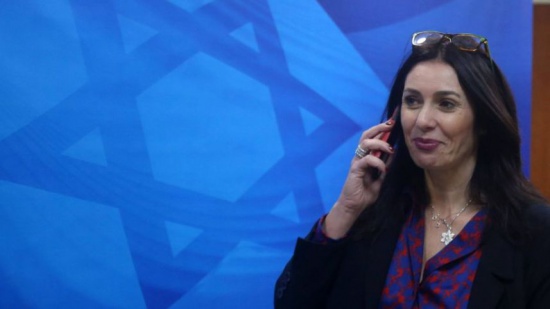Izraelská ministryně kultury se chystá cenzurovat
Izraelská ministryně kultury navrhne změnu zákona, která jejímu úřadu umožní cenzurovat státem podporované instituce a umělce ohledně loajality ke státu Šlo by tak o rozšíření zákona, který v Izraeli existuje od roku 2011. Jde o tzv. "zákon o Nakbě", podle kterého státem dotované instituce (např. školy) nesmí v Den nezávislosti Izraele uctít památku Nakby (vyhnání či zmasakrování a zničení více než 500 palestinských měst a vesnic v roce 1948), jinak by přišly o dotace. Navrhované změně zákona ministryně Miri Regev říká "zákon o kulturní loajalitě". Podle jejích vlastních slov "bude podpora kulturních institucí vůbec poprvé závislá na jejich loajalitě ke Státu Izrael". Regev také doufá, že se jí novým zákonem podaří zkrotit izraelské umělce, kteří odmítají vystupovat v nelegálních osadách na palestinském území a legitimizovat tak okupaci. V červnu 2015 podepsalo 2000 izraelských umělců petici, která varovala před anti-demokratickými opatřeními, které izraelská vláda podniká, aby omezila svobodu projevu.
Yair Ashkenazi, Haaretz: New Bill would enhance her ministry's power and allow it to condition funding for institutions on their allegiance to the state and respect for its symbols. New legislation being proposed by Culture and Sports Minister Miri Regev would authorize her ministry to cut off government funding to institutions that attack Israel and its symbols. Regev says she wants both to end her ministry’s role as an “ATM” that dispenses money but wields no influence over the content produced by the state-funded institutions, and to invest the ministry with more power to supervise their activities. Under current law, the finance minister is allowed to stop allocations to organizations that oppose the existence of Israel as the national home of the Jewish people, support terrorism or disrespect national symbols. The attorney general has ruled that the Culture Ministry does not have the authority to condition financial support for institutions on the content they present. In addition to giving her ministry decision-making power over funding, the new legislation, an amendment to the Budget Law, will call for significantly increasing the fines levied on cultural institutions that violate the law, and will allow the Culture Ministry to cancel funding before it is paid out, and not only retroactively as is the case today. The amendment to the present law would change the ministry’s mandate today, which is to encourage and strengthen art and other creative works, and to encourage cultural consumption. In practice, Regev’s proposed bill would transfer ultimate authority over the budget of her ministry and cultural institutions from the Finance Ministry, as stipulated in the so-called Nakba Law enacted by the Knesset in 2011, to her ministry. The Nakba Law grants the finance minister the power to reduce budgets allocated to state-funded bodies that openly reject Israel's standing as a Jewish and democratic state, or that mark the state’s Independence Day as a day of mourning (nakba, or "catastrophe," is the term used by Palestinians to denote the establishment of Israel in 1948). Other justifications for revoking government support include incitement to racism, terror and violence; support for an armed struggle against the state by a terrorist organization or an enemy state; and physical desecration or debasement of the flag or other symbols of the state. Specifically, Regev’s bill would transfer the responsibility for decisions to revoke funding to the allocations committee of the culture administration in the Culture and Sports Ministry. “I won’t be an ATM – I have responsibility for the public’s money and this law will grant me the authority to carry out my responsibility and revoke support for an institution that violates the law,” said Regev in an announcement released on Tuesday. “The change I will make in the Budget Law will ensure the freedom of the elected government to determine what the State of Israel will finance, according to its laws, values and policies." The Finance Ministry has yet to comment on Regev’s proposal. As far as is known, Regev’s proposed bill has yet to be studied by the Justice Ministry. Last August, after the minister said she wanted to change the criteria for funding cultural institutions by her ministry, two deputy attorney generals, Orit Koren and Dina Zilber, informed Regev that she is not legally allowed to change the criteria based on the content of the work or activities of said institutions. At the time, she clarified that she sought to amend the law, to allow her to do so. A number of incidents provoked her declaration at the time, among them, the fact that state support was being given to a play entitled “A Parallel Time,” performed at the Al-Midan Theater in Haifa and inspired by the story of a Palestinian serving a life sentence for murder. Regev ordered the funding for the theater to be frozen. The Israel Union of Performing Artists said it had received a number of calls from worried artists, and had asked the Culture Ministry for Regev’s response. The union said it was told the main, new element in the proposed legislation involved only implementation of the existing law banning attacks on the nation’s symbols. “But our union," it said in a statement, "will not agree to harming freedom of expression and artistic freedom, and so we asked to meet with [Regev] as soon as possible in order to receive clarifications on the matter.”
|
hlavní článkynejčtenějšíPalestinci v noci ubránili vesnici před dalším nájezdem osadníků, které agresivně bránila armáda Izraelští extrémisté zaútočili na další dům ve vesnici Duma, kde bylo upáleno dítě 85 Percent of Palestinians killed by Israel were Extra-Judicially Executed |
Kontaktujte nás
Fax: +420 233 552 449



